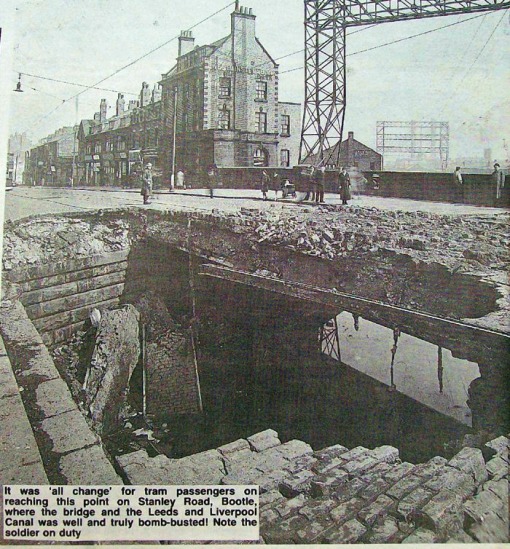

Liverpool Daily Post, May 2nd, 1941
Merseyside night raid
People buried in wrecked homes
Casualties few.
There was a short, sharp raid on Merseyside last night hundreds of incendiaries were dropped on Liverpool, but were quickly dealt with. High explosive bombs fell in residential areas, but despite indiscriminate bombing causalities are likely to be few.
For some time only the roar of guns putting up a heavy barrage could be heard, and high in the sky, was the flicker of bursting anti-aircraft fire.
Public house hit
Then, almost simultaneously from two or three different directions could be seen the glimmer of incendiary bombs. There followed high explosives, most of which fell in residential areas, wardens, rescue squads and other air-raid precaution workers were quickly on the scene when a public house was hit. Within a few minutes they had rescued several people, most escaping with a shaking or slight injury.
Bombs fell close to a cinema and theatre without doing serious damage. In one or two other areas houses were struck. The buildings affected by fire included a school, and some commercial buildings, although in no case was the fire allowed to establish a hold.
Houses demolished
A number of people were buried beneath their homes, which were demolished in a Merseyside industrial town, and some casualties occurred. In one or two instances there were some fortunate escapes. Incendiaries were showered mainly in residential districts. Then raiders dropped several sticks of high explosives.
In one demolished house was the family of an air-raid warden, from another district, who had been bombed from their home and recently had come to live in the new district. They escaped injury. Close by a former Councillor and his family had also had a fortunate escape.
In another area houses were destroyed and people hurt. The incendiaries blazed only for a short time thanks to the vigilance of fine watching parties, air-raid wardens, police and others, and no serious fire occurred. The anti-aircraft barrage was intense.
High explosive bombs were dropped by raiders passing over a Merseyside residential town, but there were no casualties
Raider shot down
When a single Nazi raider was heard high over a Western town last night it was greeted with a fierce burst of anti-aircraft gun fire. More raiders flew over the town later. During the night raids an enemy bomber was shot down.
Liverpool Daily Post, May 3rd, 1941
Severe night raid on Merseyside
Heavy casualties feared
Merseyside had its most severe raid of the year last night when enemy planes were over a widespread area in regular waves for several hours. Flares were used sparingly, but, following their usual technique, the raiders first dropped load after load of incendiaries. Thousands must have been dropped, but, teams of fire watchers were alert and succeeded in quelling many incipient fires before they had time to take hold. Reinforced by the fire brigades and the Auxiliary fire service, they performed Herculean tasks.
Waves of raiders
Seen from the top of a high building in the centre of Liverpool, the efforts of the ground defences to combat the waves of raiders as they came in made a colourful if dreadful picture. After a time some incendiaries took hold, and the occasional deep red glow of a fire could be seen, but, the outbreaks were quelled quickly by the fire brigade, so that when dawn came few fires could be seen on the skyline. Searchlights were continually tracing their patterns across the sky, and as they concentrated on their point there would come the crashing crescendo of the heavy ground defences in their greatest barrage which has been heard in Liverpool for some months. High in the sky could be seen the flicker of bursting anti-aircraft shells and, embarrassed by the barrage, more than one plane released its load before reaching its objective.
Dwelling house hit
Following the fire raising planes came the heavy drone of some of the bigger bombers, releasing high explosives over several areas. Several shops in the city were affected by the blast of the heavy bombs, and there was some damage to commercial property, but once again, dwelling houses, churches and other non-military objectives seemed to bear the brunt of the attack.
People who had taken shelter in the crypt of a church in the area which had been severely damaged the previous day were trapped when a heavy bomb struck the building. Rescue squads and other air raid precaution workers were quickly on the scene, and a number of people were extricated and quickly taken to hospital.
In one place a furniture shop was hit, and another bomb dropped close to a well known church which had already been damaged by enemy action. Fire and explosive bombs also struck blocks of dwellings, but in one big block the majority of the residents had previously sought the safety of the public shelter close by. Otherwise the casualty list which is feared heavy would have been even heavier. Fire watchers on commercial buildings were injured and in another area members of the fire service were also taken to hospital.
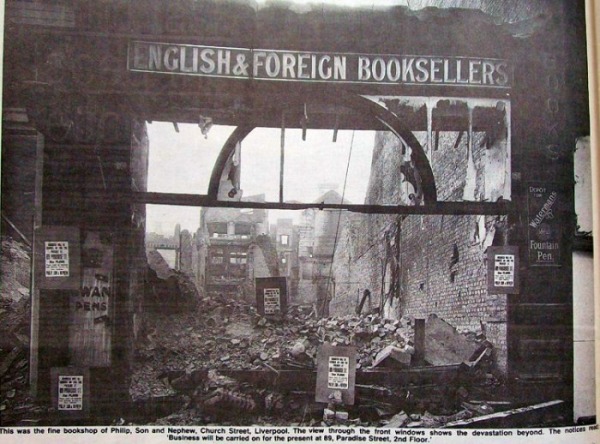
Liverpool Daily Post, May 5th, 1941
Mass night raid on Merseyside
Considerable damage and many casualties
Liverpool shopping centres suffer
Gallant work by civil defence services
Merseyside experienced on Saturday night its worst air-raid of the war. Considerable damage was done to commercial and other buildings, whilst residential property again suffered extensively, and it is feared the casualties will be heavy.
The German News Agency describes the attack as "one of the heaviest ever made" The combination of R.A.F, night fighters and anti-aircraft gunfire, however, made their night over Britain the most expensive ever for the Luftwaffe, the fighters claiming 14 raiders, and the gunners 2.
A number of cultural buildings, famous business premises and shopping centres in Liverpool, were among the property seriously damaged, while hospitals, churches, hotels, schools and many houses were hit. Gallant work was performed throughout the raid by the police, firemen, A.F.S, and all the voluntary services.
This being the fourth successive raid on the area this morning, German bombers for some hours made circuits of the area and dropped large numbers of bombs. This mornings raid was on a considerably smaller scale than Saturday nights. Each bomber on arrival was met by an intense barrage, which forced the raiders to a great height and, as the results showed, baffled them in their quest for objectives. Most of the fires started were quickly extinguished. The loss of life is not expected to be serious
Saturday night's raid on Merseyside was the severest yet experienced, thousands of fire bombs rained on a wide area followed by high explosive bombs, which were dropped in some cases on the burning buildings and among the fire fighters as they strove to quell the flames.
Many fires started
The fire services, regular and auxiliary, fire watchers and volunteers quickly tackled the fires which broke out in various business and residential parts of the city, and succeeded in minimising the damage caused. By dawn the fires had been quelled and the damage greatly restricted. Many of the fire fighters had to receive attention on the spot for blast effect, burns, cuts and other injuries.
It is feared many firemen may have lost their lives while working among blazing buildings which subsequently collapsed. One of the casualties is believed to be a prominent official of the Salvage Department. The civilian fatalities are also likely to be on a heavy scale
City buildings damaged, direct hit on hospital
Business premises, hospitals, churches, working class tenements and dwellings all bare the brunt of Merseyside's most harrowing experience of Nazi barbarism.
One municipal hospital received a direct hit from a high explosive bomb and it is feared there may have been some fatalities amongst the patients, although the medical and nursing staff heroically and without thought for personal safety succeeded in evacuating the greater portion of the patients to places of safety.
An old historic Church of England, parish church in a Liverpool suburb was almost completely burnt out, while a Welsh Chapel was practically demolished. More tan one Roman Catholic church was also ruined by fire, but in each case the Holy Eucharist was moved to a place of safety, and sacred vessels and vestments were also saved. The clergy attached to the churches had a narrow escape but one Catholic canon is understood to be among the fatalities.
Residential areas
Working class residential areas over a wide area presented a poignant sight, as humble families stood by their furniture and small pieces of personal belongings preparatory to evacuating their standing, but, uninhabitable homes, but, they bore their troubles smilingly, and mobile canteens were quickly on the scene to provide hot drinks prior to their dispersal to various reception and rest centres. Other houses were completely demolished and burnt out, but in several districts considering the severity of the raid and the extent of damage to property the casualties were small.
In other areas it is feared the death toll will be heavy and demolition workers and rescue squads were busy yesterday removing the debris in search of trapped people who may be still alive. A former special school taken over by Roman Catholic Authorities, received a direct hit.
A public shelter a short distance away also received a direct hit, several people were killed, and although the shelter collapsed, over 80 people were rescued by wardens and other helpers, through an air shaft and staircase, which withstood the force of the explosion.
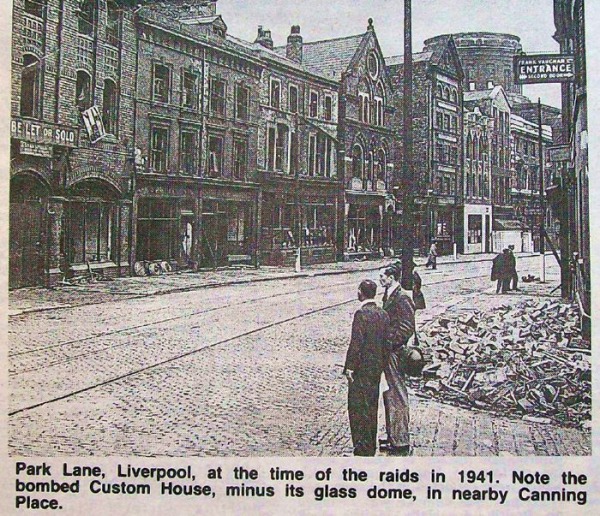
Famous business premises and shopping centres were heavily damaged. One store suffered the full impact of bombs. Stores and shops of another popular thoroughfare and within a short radius well known public buildings and business premises were completely destroyed.
Such was the indiscriminate nature of the raid that purely residential areas in the suburbs miles away from military objectives suffered the full force of the attack and many houses were demolished.
In one suburban residential area an underground shelter received a direct hit, although there were some fatalities many of the occupants, fortunately not as numerous as the previous occasion were rescued. Women from nearby houses arrived on the scene with shovels and help with the rescue work pending the arrival of the rescue party. Many of the houses in the surrounding areas also suffered direct hits from high explosives causing some fatalities, but residents in their Anderson shelters generally escaped with little more than a shaking and were quickly rescued by rescue parties and neighbours.
A Merseyside industrial town and neighbouring residential borough also suffered, and here the fiercest barrage ever heard in the district was put up driving the raiders from their objectives and causing them to drop their bombs on housing and commercial property. Several fires were started, but considering the number of incendiaries dealt with by the fire-watchers and A. F. S, the outbreaks were comparatively few.
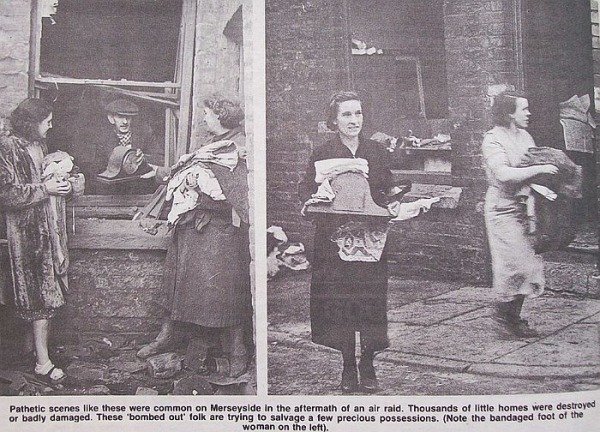
Churches were the principal "victims" several in one locality being severely damaged, the brunt of the damage was in working class areas. Here not a shelter was damaged, 80 in one surface shelter were unhurt, although the shelter was bearing tons of debris from a large laundry.
Brothers all in the Forces who were home on leave were killed as they were sitting together playing cards in the drawing-room. Their widowed mother who had not previously been away from home one night for six years had left in the afternoon to spend a few days with a daughter who was ill.
In a shopping centre a number of business premises, a post office and public library were partially demolished, not a in 100yds away had a window intact. The blast turned a corporation tram car on its side, but none of the passengers were injured.
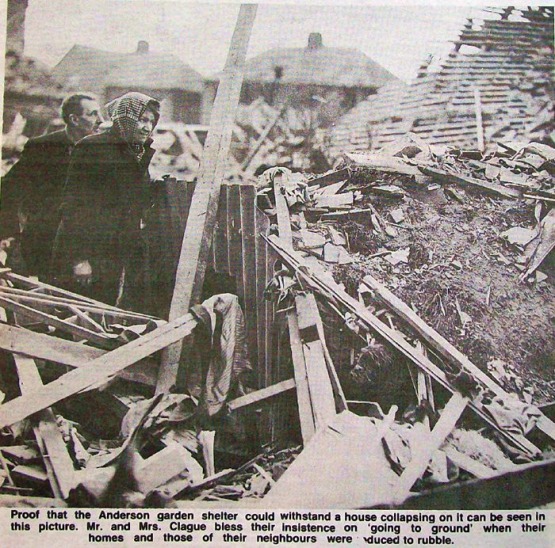
Friday nights raid on Merseyside was Liverpool's worst raid of the year, waves of enemy bombers being heard over the city for hours. Fire fighting services dealt with hundreds in incendiary bombs which fell in prelude to high explosive bombs of a heavy calibre. The raiders were met with a fierce barrage from the ground defences. While much damage was done to residential areas, some commercial buildings suffered and several fire-watchers were amongst the casualties. Plate glass showered in millions of fragments to the pavement.
Fire took a firm hold of one large commercial building, following a glancing blow from a high explosive. 60 persons in the basement shelter had a narrow escape. Only one man was injured being hit by a flying telephone switchboard. Outside a woman ambulance driver, a patient, and a constable were killed, the ambulance reduced to a mass of charred metal The resource party of 11 including two women, trapped in the basement under a large block of offices got its reward. Using a baulk of timber as a battering-ram, they made a hole in the wall between them and another basement and crawled to safety.
5 or 6 persons were killed when a high explosive bomb struck a Roman Catholic church, and penetrated down to the shelter in the crypt. 300 persons got safely away. During the night four hospitals received damage. A former church now used as an Auxiliary fire station was bombed and a church a mile away was partly demolished.
In a Merseyside residential borough a bomb burst in upon Mr and Mrs E. REYNOLDS, who were holding a family party to celebrate their Golden Wedding. They and four of their party were killed.
In a Merseyside industrial town Miss M'CUTCHEON, headmistress of an infants school, early in the raid left her home for a public shelter in a school playground. She with others was killed, meanwhile her home in a neighbouring area was destroyed. A war memorial was completely destroyed. Two deaf old people who had locked themselves in a room were rescued only with difficulty when their house caught fire.
Liverpool Daily Post, May 6th, 1941
This mornings raid on Merseyside
A wide area affected
For the fifth successive day Liverpool had a blitzkrieg this morning, when further damage was inflicted on the city, particularly in commercial and shopping quarters
A large force of German bombers arrived at an early hour and began to shower high explosive bombs and incendiaries in great numbers, the most intense attack covering a period of about an hour, and being renewed periodically.
Good work by fire-watchers
Four or five fires were started and spread rapidly, in spite of Herculean work by the fire-fighters and auxiliary services. The illumination of the sky afforded some guidance to subsequent raiders.
On the other hand many bombs indeed, the great majority were promptly and successfully dealt with by fire-watchers, so that the total number of fires proved small in relation to the magnitude of the raiders efforts. The barrage was vigorously employed and the visitations by the raiders, unlike yesterday mornings steady steam, were more intermittent and spasmodic.
It is confirmed that a second bomber was brought down on Friday night's raid on Liverpool.
Liverpool Daily Post, May 7th, 1941
Sixth successive raid on Liverpool
For the sixth successive night on Merseyside, last night suffered a severe Ariel "blitz" the brunt of the attack appeared to fall on Liverpool. At intervals night fighters were heard, enemy bombers were over the area in large numbers. For several hours what has become a familiar night drama was enacted, and the city resounded with the drone of planes and the crack of anti-aircraft fire.
Enemy planes opened the raid with high explosives, quickly followed by incendiaries. Fire soon broke out, damage was done both from blast and fire to commercial premises.
The fire-fighting services had been reinforced, and went into action with the same courage and determination as has won the admiration of the citizens in the past week. Tired and smoke-blackened men continued to work like Trojans to fight the flames
The scene, as witnessed from a building in Liverpool was of a steady red glow, topped by thick smoke, especially in one direction. In and around this flashed white sheets of light from the ground defences. Casualties are not expected to be heavy.
Liverpool Daily Post, May 9th, 1941
Merseyside's seventh successive rail
Fire-watchers and people in shelter trapped
Bent on fire raising the relays of German bombers that came over Merseyside early yesterday morning, on the seventh successive rail on the area caused a number of outbreaks in Liverpool and an industrial neighbourhood. Suburban residential districts and some shops were also affected but casualties are not expected to prove very heavy.
In one building of several storeys a bomb exploded in the basement, several people were trapped beneath piles of concrete and masonry. Within a few minutes the A.R.P rescue squads were on the scene with tackle, and joined by soldiers and police officers, worked frantically to release the trapped victims, although bombs and other debris were dropping in the vicinity.
Although there were fatal casualties the promptitude an expert way in which the rescue work was carried out resulted in several of the trapped people being got out alive and speedily moved to hospital.
Fire watchers trapped
"We will carry on" was the decision of three elderly fire watchers, who had to fight their way out of some shop property which was partially wrecked. They were Lewis ROBERTS, aged 66, of Field St, George THORNE, aged 70 of Clayford Crescent, Knotty Ash and Thomas RIMMER, aged 56, of Tennyson St. They were watching the shops when the bomb fell on some property near, ripping off a section. The men dived for cover and were buried beneath ceilings and woodwork, but managed to struggle free.
Several bombs dropped in the neighbourhood of one Liverpool church near which a large number of people were sheltering. One made a crater in the churchyard. The shelter withstood shock and blast, and the people remained safe.
Another bomb wrecked a small works and several fire watchers were trapped beneath the debris. A rescue squad worked all night, despite the tottering walls and the risk of shifting debris, the rescue workers could be seen lowering themselves into the basement.
The promptitude of fire watchers averted serious damage to a convent when some incendiary bombs fell upon the roof, and it was not necessary to evacuate any of the nuns.
Two high explosive bombs dropped near a hospital, causing two casualties, a nurse and a male attendant being injured.
High explosive bombs were dropped in a Merseyside residential area and some property was damaged. There was one casualty, a fire watcher who was badly injured and has since died. Several other fire watchers were, it is feared among the casualties.
Well known victims
Among the raid victims on Merseyside while in a commercial building was Police Sergeant F. W. PARRINGTON, the long plunge champion of the Amateur Swimming Association, 11 times between 1926 and 1939, hic best plunge being, 85ft 6ins, at Scarborough in 1926. At Balliol Rd, Baths, Bootle, on Sept 30th 1933, he made his world record plunge, 88ft 8ins. He received the Hon Association Medallion of the Royal Life-saving Society in recognition of his services in teaching Liverpool Police Officers the art of life-saving, and he held also the Davenport Cup.
Magnificent and heroic work was again done by the fire-fighting services, rescue squads and air-raid precautions, mobile canteens, emergency feeding, rest centres, first aid, ambulances, and other parties.
During recent enemy raids it is announced, Major A. S. HODGSON, the recently appointed 2nd officer of the Liverpool Salvage Corps, Superintendent H. COOKE and Salvageman H. A. JONES, were killed on duty.
Trapped in shelter
Covered with tons of debris
Men, women, and children, some of whom it is feared have lost their lives were trapped in an underground shelter in one Merseyside town when part of the building collapsed, covering the shelter entrance and emergency exits with tons of debris. Several people were rescued alive during the night. In spite of the number of bombs dropped and the damage done, casualties, apart from the shelter were remarkably few, as many residents had been evacuated.
Emergency desks
With the pressure of people seeking advice and assistance, prominent Town Hall officials had impromptu "desks" out of doors, where they quickly coped with the never ending stream of inquiries.
In a neighbouring district one large commercial building was badly damaged and residents who night after night sleep in the shelter on the firm's premises, had a narrow escape.
Liverpool Daily Post, May 10th, 1941
Thursday night's lull on Merseyside
After seven consecutive nights of mass bombing by German raiders, Liverpool experienced and revelled in lull on Thursday night, and as multitudes of workers came into the city yesterday morning the restorative affect of some hours sleep was plainly visible on their faces.
Many confesses they could hardly believe nothing had happened during the night, and there were some, who, half jocularily, wondered if the lull had some sinister significance. The previous evening, the fullest preparations were carried out as usual by all the services to face another attack, and long before nightfall great numbers of people had set out upon, the too familiar trek to the communal shelters armed with blankets, extra clothes, and food. Soon after darkness had fallen, ears were cocked for the first dread signal that the eighth blitz had been opened. Happily no incident was reported in the city, though bombs were dropped by a lone raider in a neighbouring town, where damage and casualties are believed to be slight.
The blessed respite does not by any means bring rest to the whole of the population, fire fighting, and other services, to say nothing of the wardens, fire watchers, and great bodies of volunteers always at hand for emergencies were at their posts. All night long the weary men engaged in rescue, demolition and repair duties, with little break for several days and nights, were still at their back-breaking, often, heartbreaking work. They too were thankful for the absence of the fearful accompaniment of fresh peril and destruction
Stage star's fate
Amongst the victims of the recent blitz on Liverpool was the actress and film star, Miss Mary LAWSON [Mrs F. W. L. C. BEAUMONT] who lost her life together with her husband, when the house in which she was staying was demolished by a bomb.
Miss LAWSON, a native of Darlington, aged 38, started her career at a charity matinee at the age of 17, later appearing on the variety stage and a concert parties. At 17 she sprang to fame in one night by her success when she succeeded Zelma O'NEAL, as "Flo" in "Good News" at the Carlton Theatre. A few years ago her engagement was announced to Fred PERRY, tennis champion, but this was later broken off.
She appeared in a number of popular revues and musical plays and was in Liverpool in pantomime as Dandini a few years ago. She entered into the film world in 1933 and was a great success, her husband was a film producer.
-----------
Liverpool Daily Post, May 23rd, 1941
Missing Fireman in Hospital
Thought dead by his Liverpool colleagues
A man who wandered into a Warrington police station on Saturday and collapsed, later being found suffering from loss of memory, has been identified as Roy FLETCHER, a temporary sergeant in the Liverpool Fire Brigade, of 16 Ramillies St, Liverpool. He is still in Warrington Infirmary.
For three days he was unable to give any account of himself. In the same ward was a patient of the same name, and when his name was shouted out FLETCHER recognised the sound and in a short time recovered his memory.
He was able to inform the hospital staff of his name and occupation. Fire Brigade officers from Liverpool visited the hospital and established his identity, and the story could then be pieced together. He sustained an injury to his head, which caused his loss of memory, during the heavy raids in Liverpool, but, how he came to Warrington is a mystery.
In the meantime a search had been made by his fire colleagues in the buildings where he had been at work, and a dock had also been dragged in case he had been blown into it. He had been given up as lost for nearly two weeks, when the news from Warrington came to hand.
----------
Liverpool Daily Post, May 28th, 1941
New Fire Chief
London Officer for Liverpool
Liverpool Emergency Committee have appointed Mr A. P. L. SULLIVAN of the London Fire Brigade as Acting Chief Officer of the Liverpool City Fire Brigade.
Mr SULLIVAN has been in Liverpool three weeks on fire brigade work arriving with Commander FIREBRACE during the recent big air raids.
The Fire Brigade and A.F.S, it is understood will now form a unit separate from the Police Force, and will be controlled by the Emergency Committee.
Mr SULLIVAN said, he is a Chief Superintendent of the London Fire Brigade, seconded to the Home Office on special duties. "I am now directly responsible to the Emergency Committee for the whole of the fire services of Liverpool" he said, "The national scheme of reorganisation of fire fighting services is now in course of formation, and I shall carry on in developments in Liverpool until the scheme is launched."
Mr SULLIVAN has been in the London Fire Brigade for 22 yrs, during recent years he has been on staff work, engaged largely in organising and developing the A.F.S, in London. In the last 18mths he has been helping to organise the London region of the fire fighting force.
Chief Officer H. R. OWEN who has been in charge of Liverpool Fire Brigade, during the severe air raids, was one of the fire and police officials who recently suffered from illness believed to be food-poisoning and had to go to hospital, he is now convalescent, and has been given leave of absence. Mr OWEN was awarded the M.B.E, in the last New Year Honours and has commanded the Liverpool Fire Brigade since July 1939.
© 2011, all rights reserved to date